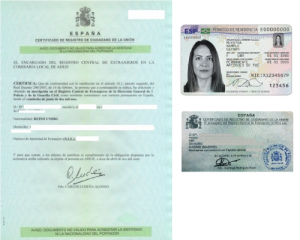
For those of us who remember the English punk rock band The Clash, you may remember a song called ‘Should I stay or should I go’ that they released in 1982. I would like to share a few bits of trivia around this … the backing vocals are in Spanish, and the band is one of the favourites of the man who led the UK out of the EU! Ironically, it was released as a double A-sided single alongside ‘Straight to Hell’ … as an 80s teenager and a BREXIT ‘remoaner’, learning this brought a smile to my face!
If I go, there will be trouble, and if I stay it will be double …
OK said tongue in cheek (lyrics from the song), but the reality is that many of our expats have now had the ‘trouble’ of taking up residency in Spain that they did not particularly want in order to ensure that they are able to stay post BREXIT without restrictions. Whilst others continue to live under the radar (commonly known among us Brits as Ostrich fever!). This is either because they want to see how things pan out post BREXIT or they just didn’t manage to complete the residency process before the 31 December 2020 deadline.
So come on and let me know …
There is a theme developing here (in case you hadn’t noticed). In this article I want to confirm your rights if you are already resident and share with you the options now open to those who find themselves in Spain without residency from January 2021.
If you were legally resident in Spain before 1 January 2021, your rights will be protected by the Withdrawal Agreement. Many people are now opting for the new TIE card. I have touched on this in a previous article, but reconfirm the situation below for your information.
Visas and residency
If you were legally resident in Spain before 1 January 2021, you will be able to stay. You must ensure you are correctly registered as a resident and children must also be registered with their own residency document.
Register on the padrón
As a resident of Spain you must also register on the padrón municipal. This is a list kept by the town hall of all the people who live in that town and is asked for in many administrative processes in Spain. It also gives you the right to vote in local elections. You must register at the address where you normally live. You cannot be registered on the padrón (‘empadronado’) at more than one address.
You do not need to own a property to register, you can still register if you are renting or live with others.
Please note, registering on the padrón municipal where you live is not the same as registering as a resident in Spain, which is a separate national register called the Registro Central de Extranjeros.
Residency
On 6 July 2020, the Spanish government introduced the Tarjeta de Identidad de Extranjero (TIE). If you are registering as a resident for the first time, you will be issued with this new biometric residence card (TIE). This card proves your rights under the Withdrawal Agreement.
If you registered as a resident before 6 July 2020, you will have a green A4 certificate or credit card-sized piece of paper from Extranjeria or the police. This is still a valid document and proves your rights under the Withdrawal Agreement.
If you have trouble using your green EU residence certificate, read the Spanish government’s informative note on documentation for UK nationals https://www.inclusion.gob.es/ficheros/brexit/nota_aclaratoria_green_certificate.pdf . I have detailed the official translation of those notes below for ease. This explains which documents you can use to prove your residence and Withdrawal Agreement rights in Spain. You can refer to this informative note when dealing with service providers as it’s also in Spanish.
You can exchange your paper EU residence document for the new TIE but you are not required to. However, the Spanish government recommends obtaining the TIE because the biometric card is more durable. It will also simplify administrative processes and border crossings. This biometric card explicitly states that it has been issued to the holder under the terms of the Withdrawal Agreement.
All UK nationals legally resident in Spain before 1 January 2021 have the right to request this card. If you apply for the TIE and have been resident in Spain for less than 5 years, you will be issued with a temporary TIE, valid for 5 years. You can apply for a permanent TIE as soon as you reach 5 years total legal residence in Spain. You do not have to wait until the original card has expired.
If you apply for the TIE and have been resident in Spain for more than 5 years, you will be issued with a permanent TIE, valid for 10 years.
Spanish government’s informative note on documentation for UK nationals: Residency rights of UK Nationals under the Withdrawal Agreement (WA)
- The UK has left the EU and the transition period has ended.
- UK Nationals who were residing in Spain before 31st December 2020 have obtained the rights set out in the Withdrawal Agreement.
- To prove that they are beneficiaries of the Withdrawal Agreement and therefore their residence status, they can use the registration certificate (known as green certificate) either A4 size or credit card, or the new residence document-TIE artículo 50 TUE.
- Registration certificates issued more than 5 years ago also remain valid, even if they do not say ‘permanente’ on them.

For clarity, this is what the three acceptable proof of residency look like.
Travelling to Spain from 1 January 2021
You must register as resident or apply for the appropriate visa if you want to stay in Spain for more than three months.
The following information reflects the UK government’s understanding of the rules currently in place for travellers using a full ‘British Citizen’ passport.
Visas
The rules for travelling or working in European countries changed on 1 January 2021. You can travel to countries in the Schengen area for up to 90 days in any 180-day period without a visa. This applies if you travel as a tourist, to visit family or friends, to attend business meetings, cultural or sports events, or for short-term studies or training.
If you are travelling to Spain and other Schengen countries without a visa, make sure your whole visit is within the 90-day limit. Visits to Schengen countries within the previous 180 days before you travel count towards your 90 days. The 26 Schengen countries are: Austria, Belgium, Czech Republic, Denmark, Estonia, Finland, France, Germany, Greece, Hungary, Iceland, Italy, Latvia, Liechtenstein, Lithuania, Luxembourg, Malta, Netherlands, Norway, Poland, Portugal, Slovakia, Slovenia, Spain, Sweden, and Switzerland.
To stay longer, to work or study, for business travel or for other reasons, you will need to meet the Spanish government’s entry requirements. Check with the Spanish Embassy what type of visa and/or work permit, you may need.
If you stay in Spain with a visa or permit, this does not count towards the 90-day visa-free limit.
Any time you spent in Spain or other Schengen countries before 1 January 2021 does not count towards your 90-day visa-free limit.
At Spanish border control, you may need to use separate lanes from EU, EEA and Swiss citizens when queueing. Your passport may be stamped on entry and exit. You may also need to show a return or onward ticket and show you have enough money for your stay.
There are separate requirements for those who are resident in Spain. If you are resident in Spain, you should carry proof of residence as well as your valid passport when you travel.
Passport validity
You must have at least 6 months left on an adult or child passport to travel to most countries in Europe (not including Ireland). This applies to the whole of Spain, including the Canary Islands and the Balearic Islands (Majorca, Menorca, Ibiza and Formentera).
If you renewed your current passport before the previous one expired, extra months may have been added to its expiry date. Any extra months on your passport over 10 years may not count towards the 6 months needed.
So you got to let me know, should I stay or should I go? …
As highly experienced and qualified Advisers, we have assisted many expats in their decision whether to become Spanish Resident or not. Often, it’s a fear of the unknown, a lack of knowledge of what special tax breaks are available to you as a resident of Spain and the fear of paying too much tax.
